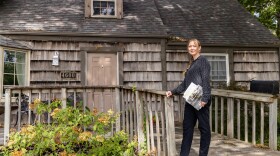Asleep at the Wheel bandleader Ray Benson moved to Austin in the early ’70s at the urging of Willie Nelson. But there was another reason he moved here.
“Well, rent was cheap and pot was cheap, you know?” he said.
Back then, he and his roommates lived off South First, splitting the $250 rent four ways. That cheap rent allowed musicians and people in the industry to live a quality life in Austin.
That’s pretty common, says Michael Seman, assistant professor of arts management at Colorado State University.
“Inexpensive housing is a huge driver of scenes and ecosystems and the broader creative economy,” he says.
People in Austin’s music ecosystem historically haven’t made much money.
“What I think surprised a lot of people when the [2015 Austin Music] Census came out is that 20% percent of … musicians are below the poverty line; about another 30% hover just right above it,” says Nikki Rowling, who conducted the study.
So the Austin music industry has had to depend on affordable housing to thrive. But, says Rowling, musicians’ incomes have “not kept up with the times or inflation or affordability issues in any way.”
Musicians have been priced out of Austin’s housing market for a while now, and some musicians, like Robert Kraft, saw the signs pretty early.
“I think like in 2009, that's when I kind of realized that I needed to probably get out of Austin if I wasn't going to change careers,” he says. “If I wanted to keep doing music and acting and voice work and also own a house, Austin was not going to work for me.”
He bought a house in Paige, just outside of Bastrop, in 2011.
But housing in Austin is much more expensive than it was in 2009. Back then the average house cost around $187,000. Now the median home price is $500,000, and much of this increase happened during the pandemic.
“In the first six months of 2021, we saw the median sales price rise by more than $100,000,” says KUT reporter Audrey McGlinchy, who covers housing.
Rental prices were also affected.
“[In] November 2020, people were paying about $1,200 in rent and then things just took a turn,” she says. “Rents that were slowly trickling down started rocketing upward. In about six months that average price in rent went up $300.”
In this current housing market, fewer artists will be able to live in Austin.
“I mean, look, they paved Music Lab and put up a Tesla shop,” Kraft says. “I don't know if you need to be hit over the head with a metaphor for what's going on.”

Musicians like Chinasa Broxton of the group Tribe Mafia say they’ll do what they need to do to live and work in Austin. He lives in a house with his team, his bandmate, videographer and producers.
“I think we have it pretty good compared to other people,” he said. “I know a lot of people are struggling really, really bad. And I feel like right now we're blessed to have roommates that are doing what we want to do, and we're going toward one goal when it comes to making music.”
The question remains: How does Austin sustain its music ecosystem as we know it in this current housing market?
Listen to the latest episode of Pause/Play by clicking the listen button above.
Subscribe to Pause/Play on Apple Podcasts, Spotify, NPROne or wherever you get your podcasts.

















